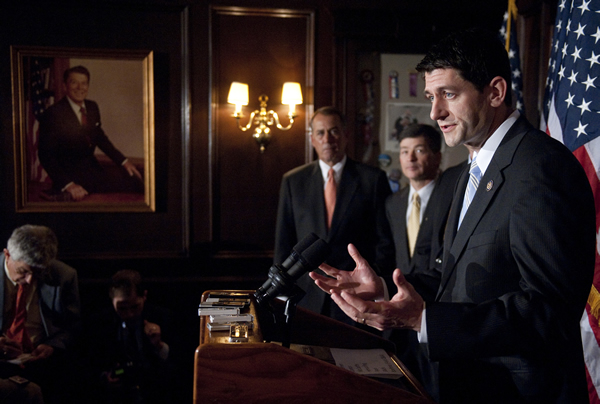Google the words “Republican Surrender.”
I stopped counting the number of relevant articles after page 10.
Google “Democrat Surrender” and by page 3, fewer than half the articles are about congressional Democrats surrendering on anything.
When your party has a large majority in the House of Representatives (the body in charge of approving new spending), enough seats (45) to play some hardball in the Senate, and a lame-duck opponent in the White House whose signature legislation, Obamacare, generates bad press daily, you would think a little courage might be in order.
But that is not where you find the party that has promised time and again to hold government accountable, rein in spending, repeal Obamacare, and reduce our growing debt.
Representative Paul Ryan (R-WI), trying to bridge the growing divide between the tea party and the D.C. establishment, told the Conservative Political Action Conference (CPAC) crowd Thursday:
For the most part, these disagreements have not been over principles—or even policies. They’ve been over tactics. So I think we should give each other the benefit of the doubt. But we, your representatives—we have to earn this benefit of the doubt.
And that is exactly the problem for many conservatives. They have a hard time pointing to exactly where the elected officials Ryan speaks of have earned such a benefit.
Even on smaller issues, the GOP establishment has laid down arms, putting what it thinks is good politics before good policy. From refusing to reform student loans to cutting deals on corporate welfare programs like the Export-Import Bank, promises made to reduce the size and costs of government have been broken.
Whether it was giving up the filibuster for presidential nominations last summer, surrendering in the battle to defund Obamacare last fall, passing a trillion dollar spending bill in January, or caving on the debt limit in February, the Republican establishment’s track record is not exactly inspiring.
The GOP’s electoral success in recent years is largely due to conservative candidates like now-Senators Ted Cruz (Texas), Mike Lee (Utah), Rand Paul (Ky.) and Marco Rubio (Fla.). They ran on conservative platforms, and voters who believed they would try to make good on those promises worked hard to elect them. They succeeded, in some cases, despite the Establishment’s support for their primary opponents.
You see, grassroots conservatives are concerned about the trajectory of the country. And despite the fact almost every Republican candidate runs on cutting spending and reducing the size of government, even when the GOP holds the White House and both houses of Congress (2001-2006 most recently), overall spending has not been cut, and government has only gotten bigger.
That inspires people to say, as my dad always did: The Republicans and Democrats are both driving the country off the cliff. The only difference is the Democrats are driving 100 mph and the Republicans are going more like 60 mph.
It’s difficult to see a difference between the parties when Americans look at the actions of Congress. That’s why actions are important.
When Sen. Ted Cruz asked for a 60-vote requirement (a supermajority) to approve bringing the debt limit bill to the floor, he was doing the one thing a minority party in the Senate can do to stop the other side. Democrats have only 55 votes; they can’t get to 60 IF Republicans stick together. But they didn’t.
Several, including Senate Minority Leader Mitch McConnell, voted to bring the bill to the floor—then voted against the bill when their votes were no longer needed for passage. So, you might say, those were for raising the debt ceiling—without any conditions that would reduce spending—before they were against. Would they have had to hold firm? Yes. Would it have been easy? No. But saving the country isn’t for sissies.
A Wall Street Journal column was one of several recently excoriating Cruz for making lawmakers cast a meaningful vote on the debt ceiling. Wrote Kimberley Strassel:
Mr. McConnell holds the same positions as Mr. Cruz on spending, ObamaCare, gun control, etc. His sin? He has refused to ask Republicans to run into the Obama fixed bayonets, a la the Cruz shutdown.
No, that is not the problem. Americans want more than someone who professes positions. They want people who will stand up for those positions and try to advance them. They want the people they elect to get off the road of increasing debt, not just drive down that road a little slower.
Genevieve Wood is Senior Contributor to The Foundry.




























